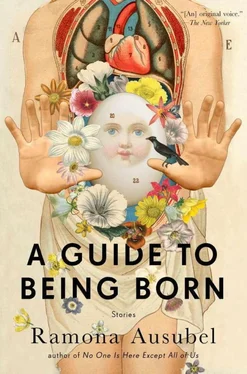• • •
EVERY EVENING IN THE NEW TOWN, the girl and the boy went walking. It was a big-window kind of place due to the ocean view. Lives were on display. Knickknacks and upholstery and kitchenware. Vases of calla lilies and a quiet mess of bills piled on a dark wood desk. The things were owned, as far as the girl and the boy could tell, by a lot of old people with very regular schedules. The white-haired woman in a button-down shirt sat alone at the glass-top dining table with a plate of potatoes and green beans, mashed and steamed. A hunched and tiny man in his big living room, modern art on the walls, watching reruns. The nurse a couple feet away, one eye on his breathing, the other on her foreign newspaper. Mondays and everyone had the football on, burying their socked feet under a pillow to keep warm.
Once they discovered them, the girl and the boy didn’t want to miss the happenings outside. They felt as if their future was being presented to them: Here you are in sixty years , the world said. Here you are in twenty . The girl and boy put their jackets on and went out to see. They saw the old men and old women enjoying glasses of red wine and, on weekends, pieces of frosting-cake. The men and women power walked. The time was over to stroll, those youthful days of enjoying the view ahead. They wore matching jumpsuits and carried foam-covered comfort weights and listened to FM radios. Their bluey-gray hair was smashed down under headbands.
The men and women brought with them little dogs who snuffed along in their kneelessness, trying to keep up. Who shat on the sidewalk. The girl and boy were surprised to see that men and women often left the little dogs’ shit where it lay. Right in the middle of that good ocean view. It got stepped in. It smeared brown over the sidewalk. The old people had to stop at the next bench and break a stick off one of the potted plants to clean their glistening white sneakers. Some were so disgusted they went straight home and threw the shoes away. Some did not mind so much and continued power walking the shit right off the shoe. They had no time to waste, Their lives were disappearing out from under them by the second. Unstoppable, those ones.
There were people in the town who still worked, whose houses were empty except for a woman who came to vacuum the floor and a man who came to trim the vines. There were dogs in these houses who were not brought out for walks and stood jealous on the furnished porches with nothing to sniff but their own deposit on the Adirondack or the terra-cotta. The girl and boy figured the little dogs craved something new, something Doberman or basset hound, but it wasn’t in the cards most of the time. Such was the life of a dog with an unretired owner. The girl and the boy decided the owners probably had the stock market numbers memorized by the time the coffeepot began to burble. Their ties had a closet to themselves. Audible love was past, but power walking still waited ahead in a future that the unretired hoped would also include polished golf clubs and visits to only the most comfortable of foreign nations.
On a day when the smell of apple pie rose out of all the kitchens and all the people were dressed in fall browns and oranges, the girl and the boy came to a house they had passed dozens of times. Now a wheelchair sat empty on the deck with a sign attached: Mae Peterson 1922–2006 Funeral on 12/27 at 2:00 p.m., St. John the Worker.
“I’m sorry, Mae, whoever you were,” the boy said.
The girl found a rock nearby and placed it on the chair.
“What are you doing?” he asked.
“I think it’s traditional. I wonder if she was satisfied with how things turned out.”
“She died right here,” the boy said, looking into the flat, unlived-in living room.
They stood there until it got dark, watching the empty wheelchair. And the stream of little dogs continued, and the stream of improved lifestyles continued, and as evening poured out, lamps were switched on and people cut their chicken into perfect little bites and the warm pie flowed smoothly down their throats.
• • •
FOR CHRISTMAS the power-walking town was covered in white lights and mechanical singing Santa Clauses, from every rooftop, window box and doorframe. Men and women, especially those with children as visitors, were all set for unwrapping and ham. The girl and the boy, sitting at their little table with a single candle flame jumping between them, said to each other, “Merry Christmas.” They tried to kiss a little. They tried to think about the next year rolling up onto their feet like sea foam, soft and welcoming.
“Will we know what to do when we are thirty? When we are forty-two?” the girl asked. The boy shrugged. “Will there be a day when you decide to get the newspaper delivered and then another when your cholesterol numbers become part of our regular lives?” He shrugged again. “I don’t know anything about wrinkle cream or about being a mother.”
“I don’t want to know until I have to,” he said. He took her smooth hand. “This year we will try some new vegetables. We’ll listen to some new music. That’s all.” The girl closed her eyes, where the darkness was filled with unanswerable questions.
“But you love me, right?” she asked.
“That is exactly what I do,” he said.
They decided to go out and see the special moments taking place all over on this Christmas Day. The families sat at the big table and forked pieces of meat and mashed potatoes. They ate the oven-cooked things and the pan-fried things and the ones that went pan first, oven second. They bit into the pumpkin pie and placed fingerfuls of whipped cream on their tongues, while the girl and boy stood on the sidewalk and looked on. No one invited them in and no one smiled at them. The girl and boy did not ask for those things and they weren’t sorry not to have them. Watching was enough, witnessing all that life. They joked about the dishes they did not have to do, the fights they did not have to have with frustrating uncles.
Candles did their dances across the length of the white lace while the diners updated one another on the outlines of their lives. From the sidewalk, the girl narrated for the women and the boy narrated for the men. “She’s reminding her father to settle the matter of the upstairs carpet,” the girl said.
“And he wants to know if she’s gone to the dentist,” the boy added.
“Those two over there don’t usually get along. They fight about each other’s spending habits,” she said.
“Now they are laughing at the story the aunt just told about a minor car accident.” Steam rose from the dishes a lot at first, a little, and then barely at all, except through a crack between lid and body of the soup pot. People picked their forks up less and less often and everyone started to lean down, heavy, toward the floor.
It was dark and cold out. The light from the strands over the windows was crisp.
“Should we go home?” the boy asked.
“Not yet,” she said. “What would we miss?”
A lot of the houses were dark now, the toys flung down and the flannel pajamas worn for the very first, and perhaps last, time.
“Are they satisfied with the birthday party for their Lord?” the boy asked. “Do you think they had a good time?”
“Yes. But they’re tired. It took a lot out of them. Now they’re trying to get ready for the New Year. They have to plan for everything that will happen.”
“The reduction of their thighs, for example,” the boy said.
“Don’t joke,” she said, “they have a lot to worry about.”
The old man in the biggest house, with his couch that stretched the full length of the living room, facing out at the sidewalk, was an unmoving lump there. His small, wrinkled body covered maybe a quarter of the brown leather. Under his blue plaid blanket, he looked like a fish about to be devoured by his enormous house.
Читать дальше












